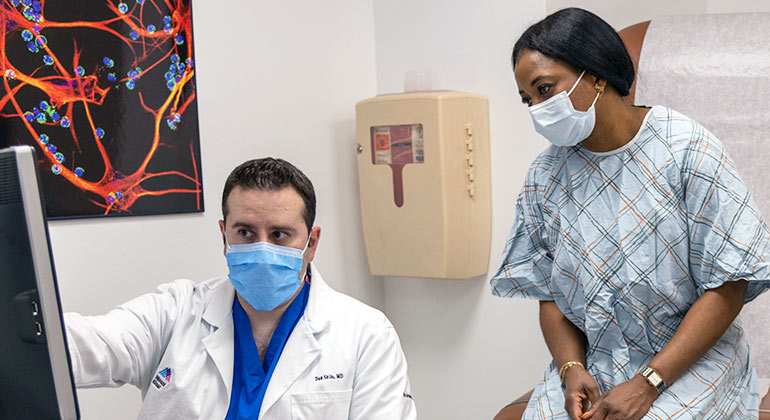Knee Osteoarthritis

Osteoarthritis affects more than one in three Americans and is a significant cause of pain and discomfort. Osteoarthritis causes the cartilage in your knee joint to break down, which means the bones in the knee rub against each other. This causes pain, stiffness, and swelling, as well as inflammation in the lining of the joint, called the synovium.
There are a number of ways to treat knee pain due to osteoarthritis including pills, injections, and physical therapy. In some cases, these approaches are not effective or don’t last long. Some patients will eventually require joint replacement.
The Procedure
At Mount Sinai, we offer Genicular Artery Embolization (GAE), a new technique to treat knee pain caused by osteoarthritis.
With this procedure, our doctors access blood vessels in the groin and use real-time image guidance to direct a small catheter (tiny hollow tube) to the arteries that supply blood to the synovium in the knee. Once our doctors have identified the correct blood vessel, they will inject small particles--smaller than a grain of sand--in order to decrease blood flow to the inflamed synovium of the knee that sends pain signals to the brain.
What to Expect
We use conscious sedation, also called “twilight” sedation, rather than general anesthesia. Not only is conscious sedation safer than general anesthesia with fewer side effects, but it allows you to recover and go home more quickly after the procedure. Nearly all patients undergoing GAE go home the same day after a 1-2 hour recovery with just a small bandage on the groin. Normal activities can be resumed the next day.
You should feel significant improvement within a few weeks. For most patients, the pain is significantly reduced. Some patients don’t require any further treatment, though some patients do continue to receive injections. You will follow up with your doctor after the procedure in the office.
Who Is a Good Candidate?
You are a good candidate for genicular artery embolization if:
- You have moderate to severe knee pain because of osteoarthritis
- Physical therapy, medications, or joint injections have not helped your pain
- You want a quick recovery
- You do not desire, or are not a candidate, for knee replacement at this time